Partner bonding Getting your partner involved in pregnancy
Many men feel
somewhat left out during their partner's pregnancy since all the
attention is focused on the woman. Here are some ways to involve your
partner.
Encourage him to attend your prenatal checkups, where he can ask questions and listen to the heartbeat.
Attend birth preparation classes together.
Spend time at home reading about birth and baby care and share opinions.
Write a birth plan together
.
Share practical arrangements, such as planning and decorating the nursery and choosing baby equipment.
First kick
The moment when you feel
your baby's first movements is a truly emotional experience, as you
start to become completely aware of, and connect with, the baby growing
inside you. Usually, the first movements are felt as a fluttering
sensation, or a “quickening,” as your baby starts to stretch and turn.
This can be felt from around 18 weeks, although for some women it is
much later; if you have had a baby before you are likely to be aware of
these movements earlier, but for a first baby, awareness of the baby's
movements is usually later, around 22 weeks. It is not until about 24
weeks that you will really start to feel regular, more definite
movements and you will soon become accustomed to your baby's activities.
Your baby's movements:
As your belly grows,
your baby is increasingly active and you will feel unmistakable
movements. Sharing this with your partner is an exciting prospect.

NOTE
The very first sound your baby hears is your heart beating, and the first sound you will hear from your baby is his heartbeat
NOTE
Try putting on some of your favorite music and see whether your baby responds—enjoy a dance together!
NOTE
Talking to your unborn baby helps you to feel connected, and as his hearing develops he will recognize your voice
NOTE
Try not to fret about how you might feel toward your baby. Love is not always instant—it can take time to grow and develop
Baby's development How your baby grows
From the moment of
conception, the minute cluster of cells that is your baby starts to
develop rapidly into a fully formed human being. Your baby takes all the
nourishment from you that he needs to bring about this miracle of new
life.
| Q: |
What is happening in the first two trimesters?
|
| A: |
In the first 12 weeks of life, your baby is changing rapidly
from an indistinct bundle of cells into an identifiable human form.
During this time, the body starts to form and all the major organs are
developing. By eight weeks, the four chambers of the heart have formed
and it can be seen beating on an ultrasound. Your baby, now called a
fetus, loses its tail and limbs start to form. By 12 weeks, the end of
the first trimester, your baby is fully formed; facial features are
developing, and the major organs are beginning to function. The second
trimester, from weeks 13 to 27, is a period of rapid growth as your baby
grows around 2 in (6 cm) each month. Your baby starts to move and he
can swallow and hear sounds outside the womb. By 24 weeks, most body
systems are formed and, except for the lungs, the major organs are
working.
|
First trimester:
In the first
trimester of pregnancy, your baby develops from a tiny bundle of cells
into a fetus measuring around 4–5 in (10–12 cm). In this trimester, all
the major organs form and develop along with the bones and muscles. The
placenta is also developing and will eventually become the baby's
life-support system, taking over from the maternal hormones.
Second trimester:
Your baby's weight
increases significantly as he lays down fat supplies, and his body
begins to look more in proportion. The skin is still thin and
transparent, with blood vessels visible.
Third Trimester
By the third trimester, at 28
weeks, your baby has put on considerable weight and, if born now, would
possibly be able to survive out of the womb with special medical care.
| Q: |
What is happening in the third trimester?
|
| A: |
During the last trimester, your baby becomes much more active
and is likely to have some sort of sleeping and waking routine; he also
starts to fill out and resemble a newborn as fat deposits are laid down.
The organs are continuing to mature and body systems are becoming more
and more complex. The brain and nervous system develop rapidly (the
brain continues to develop after birth) and by 36 weeks, the liver and
kidneys are fully developed and the liver is starting to process waste
products. The digestive system has formed and the intestines are filled
with meconium, a dark green substance made up of waste products. The
lungs are among the last organs to fully develop, but by 40 weeks these
are fully functioning and your baby starts to practice small “breaths”.
|
Third trimester:
Your baby's skin loses its transparency and he begins to resemble a newborn baby.
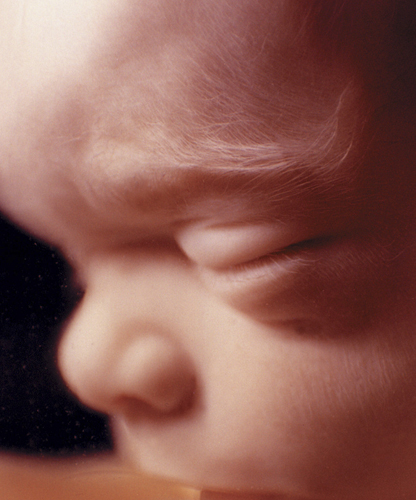
1. Weeks 6–7
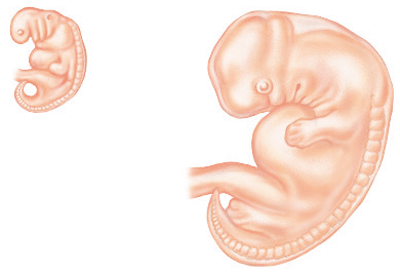
2. At 8 weeks:
Your baby measures just 1
in (21/2 cm). His skin is translucent, but the facial features and limbs
are starting to form and he is becoming recognizably human.
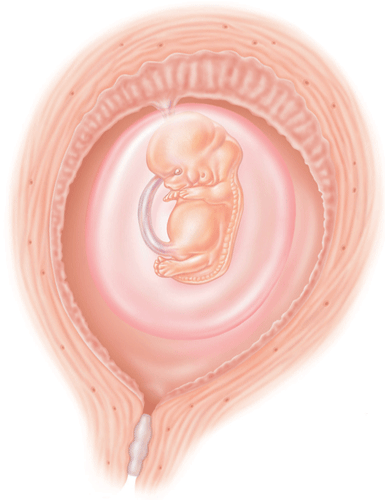
3. At 12 weeks:
Your baby is 21/2 in (7
cm). The face now has a chin, forehead, eyes (shut), nose, and ears high
on the head. The fingers and toes have separated.
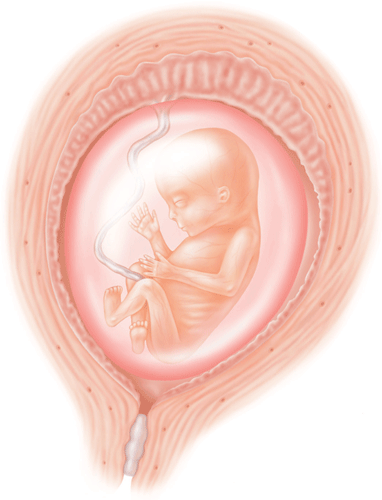
4. At 16 weeks:
By the second trimester, your baby has doubled in length. The limbs are more developed, but the skin is still translucent.
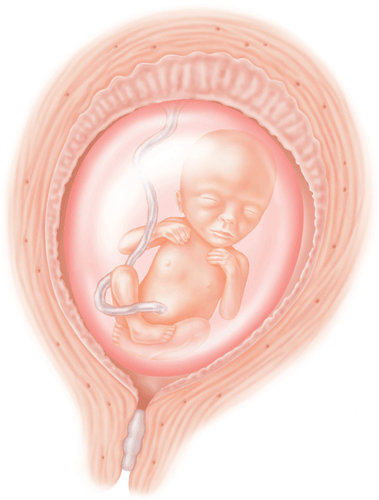
5. At 20 weeks:
Your baby is 6 in (15 cm)
crown to rump and is laying down fat deposits. Fine hair called lanugo
covers him. His eyes are still tight shut.
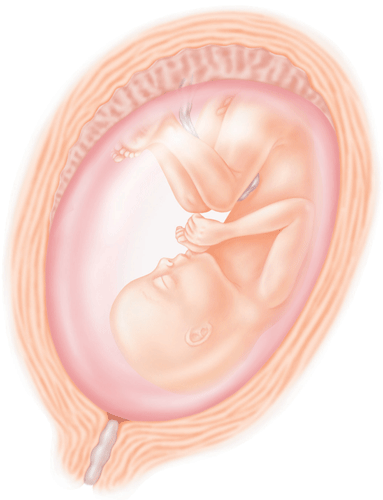
6. At 24 weeks:
Your baby is 8 in (20 cm)
and starts to fill out and the skin is no longer translucent. His eyes
can now open and his facial features are fully formed.
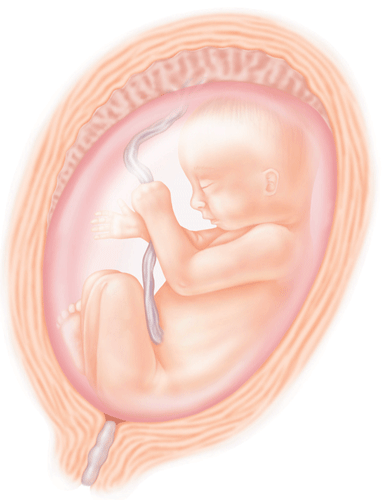
7. At 28 weeks:
By the third trimester, your baby is now much more in proportion. A greasy, protective substance called vernix covers the skin.
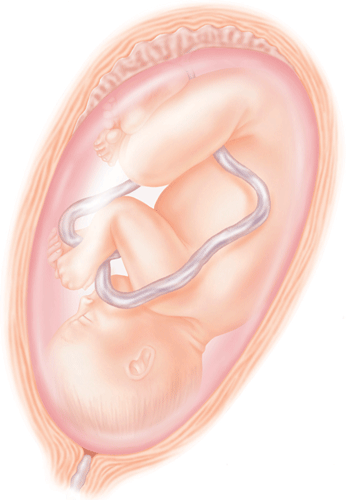
8. At 32 weeks:
Your baby now
measures about 12in (30cm) crown to rump. The skin is flesh-colored and
much less wrinkled. The fingernails are now fully formed.
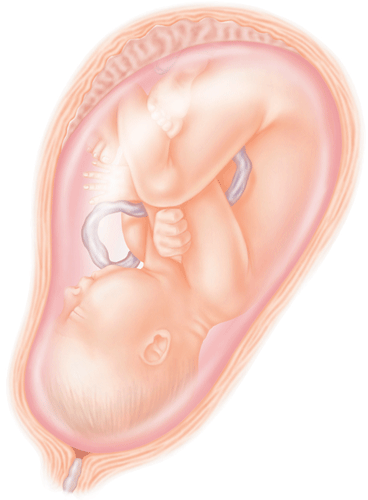
9. At 36 weeks:
Your baby now resembles a newborn. Hair is growing on the head and the fine body hair, lanugo, is beginning to disappear.
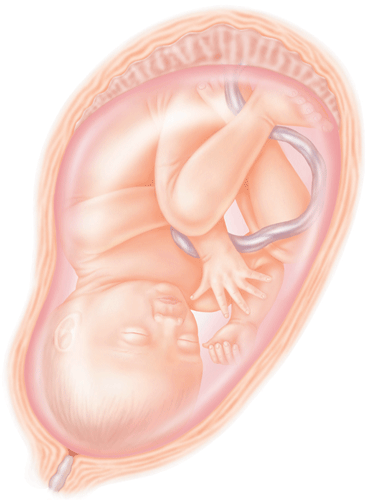
10. At 40 weeks:
At 14 in (36 cm) crown to rump, your baby is quite plump since he has laid down plenty of fat deposits in the last four weeks.
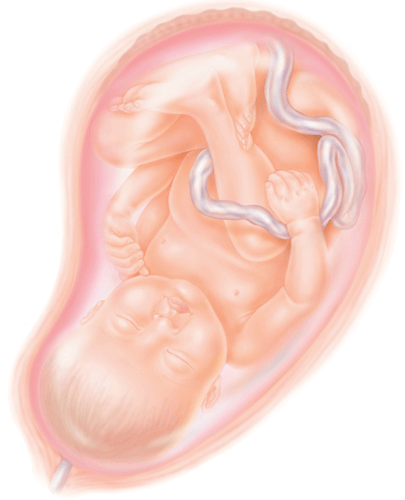
Myths and misconceptions Is it true that…
| Q: |
A fast heartbeat means it's a girl?
|
| A: |
Even midwives and obstetricians have been known to say this, but there's no evidence to back it up. In any case, your baby's heartbeat is likely to vary, depending on how active he or she is when being monitored.
|
| Q: |
You can tangle the umbilical cord by raising your arms above your head?
|
| A: |
Don't worry about this one! Nothing you do has any bearing on your baby's umbilical cord.
How tangled the cord becomes is due to your baby's activity in the
uterus when very small. If your baby's activity has caused the cord to
become a little tangled, the midwife will be able to unwind it gently at
birth.
|
| Q: |
I'm carrying low so it must be a boy?
|
| A: |
This is
unlikely! The general story goes that if you're carrying low, you're
having a boy, if you're carrying high, then you're having a girl. The
truth is, the way you carry is probably determined by your muscle and
uterine tone as well as the position of your baby.
There are lots of other girl-boy myths: if you have soft hands you're
having a girl, rough hands you're having a boy; if the father-to-be is
nervous it's a girl, if he's relaxed it's a boy; if the mother picks up
her coffee cup with two hands it's a girl, if she picks it up by the
handle it's a boy; if you have a sensitive belly button it's a girl, if
you have cold feet it's a boy… the list is endless!
|